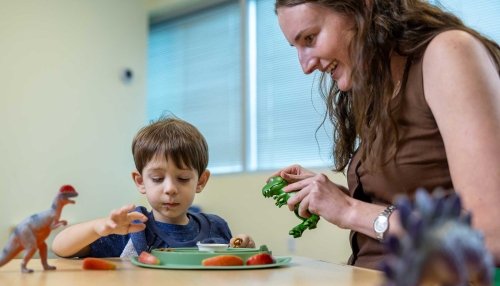Healthy Eating Habits Start Early
Pediatrician Dr. Horlick explains how parents can help their children establish positive eating habits


Written by Nancy Horlick, M.D., Clinical Assistant Professor, Arizona College of Osteopathic Medicine, Multispecialty Clinic
Good nutrition plays a critical role in your child’s growth, development, and overall well-being.
Read on for tips to ensure your child is getting the right nutrients.
1. Always Remember Breakfast!
- Start the day with a nutritious breakfast. Include protein (e.g., eggs, yogurt, nuts) and fiber (e.g., whole grains, fruit).
- Breakfast helps boost energy levels and supports concentration throughout the school day.
2. Prioritize Fruits and Vegetables
- Aim for at least 5 servings of fruits and vegetables each day.
- Keep a colorful variety of fruits and veggies at home and make them fun and accessible (e.g., cut-up fruit, veggie sticks with healthy dips).
3. Focus on Whole Grains
- Choose whole grains like whole wheat bread, brown rice, and oatmeal instead of refined grains (e.g., white bread, sugary cereals).
- Whole grains provide fiber and essential nutrients that support healthy digestion and growth.
4. Lean Proteins Are Key
- Include healthy protein sources like chicken, turkey, fish, beans, tofu, and eggs in your child’s diet.
- These proteins support muscle growth and repair.
5. Hydrate with Water
- Encourage your child to drink water throughout the day rather than sugary drinks like soda or juice.
- Water keeps kids hydrated, supports healthy kidneys, and keeps their energy levels stable.
6. Limit Processed Foods
- Minimize packaged snacks, sweets, and fast food. These often contain unhealthy fats, excessive sugar, and salt.
- Instead, offer healthier alternatives like nuts, yogurt, or homemade fruit snacks.
7. Teach Portion Control
- Help your child understand healthy portion sizes and avoid overeating.
- Fist size is a rough estimate of serving size.
- Serve meals on smaller plates to encourage mindful eating.
- Be mindful of what you are eating and enjoy each bite!
Remember:
A well-balanced diet and regular physical activity are essential to your child’s growth, development, and long-term health.



